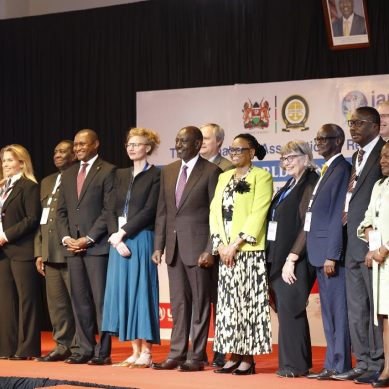
In the final lead-up to the US presidential election, Elon Musk has thrown the full weight of his celebrity and his resources behind former president and Republican nominee Donald Trump. Trump was on Wednesday declared winner of the 2024 presidential election and become the 47th president of the United States – a rarity.
Musk has appeared with Trump on the campaign trail; pumped money into a pro-Trump PAC (which has, in turn, bought ads on the platform he owns); and made X a hotbed of right-wing conspiracy theories, some of which he has personally boosted, that many experts say are designed to undermine faith in the outcome of the elections.
But Musk’s behaviour is also having another effect: It’s taking scrutiny off other tech leaders and companies, even as they cozy up to Trump or roll back policies that would protect the information ecosystem ahead of a major election.
“In a race to the bottom, Elon Musk paved the way for a new, toxic tech basement,” says Nora Benavidez, senior counsel at the nonprofit Free Press. “Yet, as long as other platforms aren’t quite as abysmal, they squeak by under cover of Twitter’s failures.”
Social media companies have largely replaced traditional media conglomerates as gateways to information. According to a Pew Research study, 54 per cent of adults now get at least some of their news from social media. And that number is much higher for people below the age of 50. Sixty-four per cent of people aged 30-49 and 78 per cent of people 18-29 get news from social media.
“[Musk] is smart enough to understand that to control the narrative, you want to control the media,” says a former Twitter employee. “And social media is media.”
But these companies don’t face the same kind of restrictions and responsibilities that traditional media do. Section 230 prevents social media companies from being held legally liable for the content on their platforms. Content moderation is largely voluntary, except in cases where the content itself is illegal (like child sexual abuse material), which has its own consequences.
A 2020 study from the Harvard Misinformation Review found that people who relied on social media for their news were more likely to believe misinformation about the Covid-19 pandemic. A different Pew Research study, also from 2020, found that Americans who relied on social media for their news had lower political knowledge than those who didn’t.
After months of campaigning, scandal, propaganda and downright weirdness, it all comes down to this. But for years, public pressure from government officials, civil society and the media pushed tech companies to invest in teams and tools that could at least somewhat address issues of hate speech or misinformation on their platforms, so they could say they were making a good-faith effort to deal with the issue.
Musk’s purchase of Twitter signalled a change, according to six former trust and safety employees from Twitter and Meta.
When Musk took over Twitter in October 2022, he quickly fired more than 50 per cent of the company’s workers, including almost all of the company’s trust and safety and policy staff – the people tasked with creating and enforcing the platform’s policies around things like hate speech, violent content, conspiracy theories, and mis- and disinformation. Since then, Meta, Google, Amazon, and Discord have all made cuts to trust and safety staff.
Shortly after Musk purged Twitter of its trust and safety teams, other companies began layoffs. In November 2022, Meta laid off 11,000 employees, including many trust and safety employees. In January 2023, Google followed suit, axing 12,000 people. Earlier this year, Twitch, which is owned by Amazon, disbanded its Safety Advisory Council.
“I think that Elon really opened the floodgates,” says one former Meta employee. “So then other tech brands were like, ‘We can do that too, because we won’t be the black sheep for it.’”
Meta spokesperson Corey Chambliss says the company has “40,000 people globally working on safety and security – more than during the 2020 cycle, when we had a global team of 35,000 people working in this area,” though he did not address how many of those people are staff versus outsourced workers.
Musk’s sudden firings made it so that “anybody else could come along and nicely fire their teams and give them severance and it was nicer. Better,” says a former Twitter employee who was fired by Musk.
After Musk fired the trust and safety staff, experts warned that this cut, coupled with Musk’s “free speech absolutism,” would allow toxic content to flood the platform and ultimately cause an exodus of users and advertisers, leading to Twitter’s eventual demise. Hate speech and misinformation did increase, and advertisers did pull their dollars.
Last year, X fired members of what remained of its elections team. Around the same time, Musk posted on X, saying, “Oh you mean the ‘Election Integrity’ Team that was undermining election integrity? Yeah, they’re gone.” But X is still alive and kicking.
Musk’s behaviour, say the former employees, acted as cover for other platforms that saw trust and safety work as a burdensome cost. The work of teams focused on ad sales or user engagement drives growth and money for platforms. Trust and safety teams, former employees say, do not. This makes them easy targets when companies tighten their belts.
“I think [layoffs] were something Mark [Zuckerberg] wanted to do for a long time,” says the former Meta employee. “And so, if Twitter can get away with having less good technology and less good infrastructure than other companies, and is still getting rid of thousands of people, which is proportionally way more than any amount laid off by Google or anyone else, then I think that that kind of empowered other companies too.”
Chambliss says that Musk’s decisions did not play a role in Meta’s layoffs, referring to a 2023 post about the company’s “year of efficiency.”
It’s not just staffing that has shifted since Musk took the helm at X. Google and Meta have made significant changes to how they handle political content and mis- and disinformation.
- A Tell / Wired report








